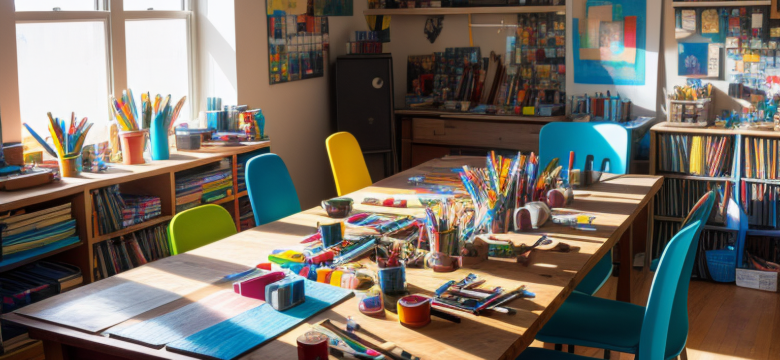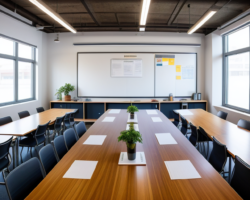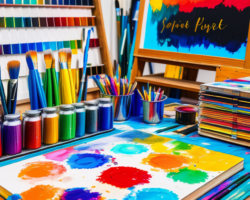Are you ready to transform your workshops into a whirlwind of creativity and engagement? Well, you’ve come to the right place! This article explores innovative workshop ideas that are designed to spark creativity and encourage active participation. Imagine a space where ideas flow freely, and every participant feels empowered to contribute. From hands-on activities that get everyone involved to collaborative projects that foster teamwork, we’ll dive into various strategies that can help you create a dynamic learning environment.
Let’s face it, workshops can sometimes feel a bit stale, can’t they? But with the right approach, you can turn a mundane session into an exciting experience. Think of your workshop as a canvas; each idea you implement adds a splash of colour, making it more vibrant and appealing. Whether it’s through creative icebreakers that set the tone or interactive group discussions that promote collaboration, the goal is to make every participant feel valued and engaged.
So, buckle up and get ready to explore these workshop ideas that are not just about learning but about inspiring and transforming the way we think and interact. Together, we can create an atmosphere where creativity thrives and everyone walks away feeling motivated!
Creative Icebreakers
Effective icebreakers set the tone for a workshop, acting like the warm-up before a big game. They encourage interaction and help participants feel comfortable, paving the way for a productive session filled with collaboration and creativity. Imagine walking into a room full of strangers; an icebreaker can transform that awkward silence into lively chatter in just moments!
Here are some engaging icebreaker ideas:
- Two Truths and a Lie: Each participant shares two truths and one lie about themselves, while others guess which statement is the false one. This not only sparks conversation but also helps everyone learn fun facts about each other.
- Human Bingo: Create bingo cards with different characteristics or experiences. Participants mingle to find others who match the descriptions, promoting interaction and laughter.
- Story Cubes: Use dice with images on them. Participants roll the dice and create a story based on the images that appear. This activity ignites creativity and showcases storytelling skills.
By incorporating such creative icebreakers, you can turn a group of individuals into a cohesive team, ready to dive into the workshop’s content with enthusiasm and openness. Remember, the goal is to foster a sense of community that encourages everyone to engage fully!
Hands-On Activities
Incorporating into your workshop can transform the way participants engage with the material. Imagine diving into a world where learning is not just a passive experience but an exciting adventure! When participants physically interact with tools, materials, or concepts, they are more likely to absorb and retain information. It’s akin to learning to ride a bike; you can read all the manuals, but until you hop on and pedal, you won’t truly grasp the experience.
These activities can take many forms, from crafting projects to interactive simulations. For instance, consider a workshop focusing on sustainability. Participants could work in groups to create a small garden using recycled materials, fostering teamwork while also embedding important lessons about environmental responsibility. The tactile nature of such tasks ignites creativity and encourages participants to think critically about their actions.
Furthermore, hands-on activities can also include role-playing exercises or case studies. By simulating real-life scenarios, participants can practice problem-solving in a safe environment, allowing them to explore various outcomes without the fear of real-world repercussions. This approach not only boosts confidence but also cultivates a deeper understanding of the subject matter.
Ultimately, the goal is to create an atmosphere where participants feel empowered to explore, experiment, and express their ideas. By integrating hands-on activities, you are not just teaching; you are facilitating a vibrant learning journey that can lead to lasting change and innovation.
Interactive Group Discussions
Interactive group discussions are like the secret sauce that can transform a mundane workshop into a vibrant exchange of ideas. Imagine a room buzzing with energy, where participants toss around thoughts like a game of catch, each idea building on the last. These discussions create an atmosphere where everyone feels empowered to share their insights, leading to a rich tapestry of perspectives.
During these sessions, participants are encouraged to express their opinions freely. This not only fosters a sense of community but also sparks creativity and innovation. Think of it as a brainstorming session where no idea is too outlandish. To kick off these discussions, consider using guiding questions that prompt deeper thinking. For instance:
- What challenges have you faced in your role?
- How can we apply these concepts in real-world situations?
- What unique solutions can we come up with together?
Moreover, incorporating techniques like ‘think-pair-share’ can elevate the experience further. Participants first contemplate their thoughts individually, then share with a partner before presenting to the larger group. This method not only boosts confidence but also ensures that quieter voices are heard. By the end of the discussion, participants will walk away not just with new knowledge, but with a sense of camaraderie and shared purpose, making the workshop a memorable experience.
Creative Problem-Solving Sessions
Creative problem-solving sessions are like a breath of fresh air in a stuffy room. They challenge participants to think outside the box and approach issues from unique angles. Imagine a group of individuals, each bringing their own experiences and perspectives to the table, ready to tackle real-world problems. This collaborative environment not only fosters innovation but also strengthens team dynamics. By working together, participants can generate ideas that might not surface in a more traditional setting.
During these sessions, it’s essential to create a safe space where everyone feels comfortable sharing their thoughts. Techniques such as brainstorming, role-playing, and even mind mapping can be employed to stimulate creative thinking. For instance, consider using a mind map to visualise connections between ideas, helping participants see the bigger picture. This method can effectively break down complex problems into manageable parts, making it easier to devise innovative solutions.
Furthermore, incorporating real-life scenarios can make the sessions even more impactful. By presenting participants with genuine challenges, they can not only apply their knowledge but also develop practical strategies that can be implemented in their own contexts. This hands-on approach ensures that the ideas generated are not just theoretical but have the potential for real-world application.
Guest Speakers and Experts
Inviting guest speakers or industry experts to your workshop can be a game changer. Imagine having someone who has walked the path you’re exploring, sharing their experiences and insights. It’s like having a treasure map in a sea of uncertainty! These speakers not only bring a wealth of knowledge but also infuse energy into the room. Their stories can resonate deeply, motivating participants to rethink their approaches and challenge the status quo.
Moreover, guest speakers provide a unique opportunity for real-world connections. When participants hear about challenges and successes from those who have been in the trenches, it sparks curiosity and fosters a sense of community. This interaction can lead to dynamic discussions, where attendees feel empowered to ask questions and share their own experiences.
To make the most of these sessions, consider the following:
- Choose Relevant Speakers: Select individuals whose expertise aligns with the workshop’s theme.
- Encourage Interaction: Allow time for Q&A sessions to deepen engagement.
- Provide Context: Share information about the speaker’s background to enhance credibility.
Incorporating guest speakers into your workshop not only enriches the learning experience but also inspires participants to take actionable steps towards their goals. So, why not take the leap and invite someone who can ignite that spark of creativity?
Feedback and Reflection Activities
Feedback and reflection activities are the backbone of any successful workshop, acting like a mirror that helps participants see their progress and areas for improvement. Imagine standing in front of a mirror after a long day; you notice what went well and what could use a little tweaking. This is exactly what these activities provide—a chance to pause, reflect, and recalibrate.
Incorporating structured feedback sessions allows participants to share their thoughts on the workshop experience. This could include discussing what they found valuable, what could be improved, or how certain activities resonated with them. By fostering an environment where everyone feels comfortable sharing, you create a rich tapestry of insights that can propel future workshops to new heights.
Additionally, reflection activities can take various forms. For example, participants might engage in:
- Journaling their thoughts and feelings about the workshop.
- Small group discussions to delve deeper into their learning experiences.
- Creating action plans based on what they’ve learned to implement in their own contexts.
Ultimately, these activities not only encourage personal growth but also ensure that the knowledge gained during the workshop is not just a fleeting moment but a stepping stone to continued development. By embedding feedback and reflection into the workshop structure, you empower participants to take charge of their learning journey, transforming insights into actionable strategies.
Follow-Up and Implementation Plans
After an inspiring workshop, the real challenge begins: turning ideas into action. Follow-up and implementation plans are essential to ensure that the spark of creativity ignited during the session continues to glow brightly. Without a clear path forward, even the best ideas can fizzle out like a damp firework. So, how can we keep the momentum going?
Firstly, it’s crucial to establish clear next steps. This can be achieved by creating a structured plan that outlines specific actions participants can take to apply what they’ve learned. For example, consider using a simple table to map out these actions:
| Action Item | Responsible Person | Deadline |
|---|---|---|
| Develop a project proposal | Jane Doe | 2 weeks |
| Schedule a follow-up meeting | John Smith | 1 month |
Additionally, encouraging participants to share their progress can create a sense of accountability. Setting up a group chat or forum can facilitate ongoing discussions and support. This not only fosters a collaborative environment but also helps participants feel connected and motivated.
Lastly, don’t forget to celebrate small wins along the way. Acknowledging progress, no matter how minor, can boost morale and inspire further action. Remember, the journey from idea to implementation is a marathon, not a sprint, so keep the enthusiasm alive!
Frequently Asked Questions
- What are some effective icebreakers for workshops?
Effective icebreakers can include fun activities like two truths and a lie, or a quick group quiz. These not only lighten the mood but also encourage participants to engage with one another right from the start!
- How can hands-on activities enhance learning?
Hands-on activities allow participants to actively engage with the material, making concepts more relatable and easier to grasp. Think of it like learning to ride a bike; you can read about it, but nothing beats the experience of actually doing it!
- What role do guest speakers play in workshops?
Guest speakers bring a wealth of knowledge and fresh perspectives. Their real-world experiences can inspire participants and provide insights that might not be covered in traditional training sessions.
- Why is feedback important in workshops?
Feedback is crucial as it helps participants reflect on their learning. It’s like having a mirror; it shows you where you can improve and what strengths you can build upon for future growth.





